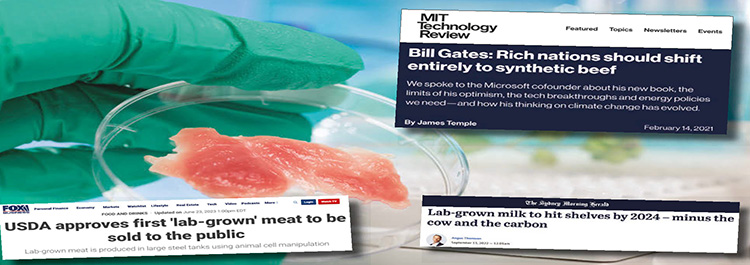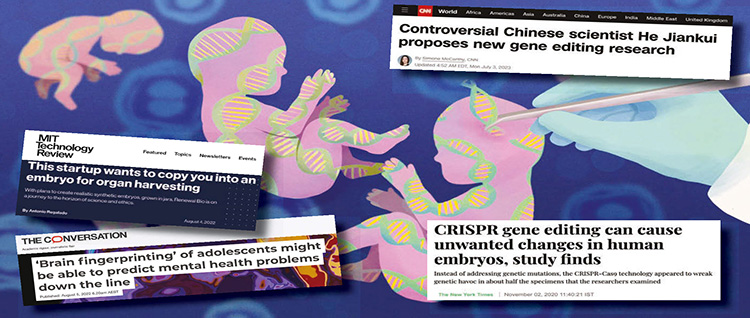From New Dawn Special Issue Vol 17 No 6 (Dec 2023)
We are currently living through one of the most important periods in human history, as the ruling class biofascists move to transform the world into something out of a science fiction novel.
The following piece looks at some of the most pressing world-altering agendas currently on the horizon for the future of society – and what we can do to fight back.
The End of Cash?
The world is changing and changing quickly. Most of society remains blissfully unaware – through targeted propaganda campaigns – of the reality that awaits them (if allowed) across this decade.
Perhaps the most pressing transition that countries will see in the foreseeable future is major shakeups to our financial institutions and economies.
The collapses in March 2023 of Silicon Valley Bank and Signature Bank in the US led some to wonder if the world may be headed for a new widespread banking crisis.
Switzerland’s Credit Suisse also collapsed in March and was purchased shortly by UBS in a deal approved by Swiss regulators without shareholder approval.
As a result, Australian financial regulators recently called for an urgent review of the nation’s preparedness and management for “future banking turmoil” following the speed of lender runs.1
Experts put the odds of a recession before July 2024 at 59 per cent. Emergency meetings held by regulators of late show they are keeping a keen eye on any further instability.
The timing couldn’t come at a more ‘convenient’ moment for those in power.
As they say, ‘never let a good crisis go to waste’, and to combat this ‘turmoil’, the state is already looking to transition from this financial model into a new, centralised, digital dystopia.
For years, Australia has been phasing out cash. In 2021, financial experts forecasted that this country would become “functionally cashless” in 2024.2
Now, as we enter this crucial timeframe, we see many changes begin to unfold.
In July 2023, it was announced that cash is no longer available over the counter at a number of Commonwealth Bank locations, with a move to focus on “more complex banking needs.”3
This was soon followed by Macquarie Bank, our fifth largest, announcing it will “phase out” cash, cheque and phone payments for customers from 2024.
In a policy notice update, the bank stated that by November 2024, customers will be unable to write or deposit cheques (including bank cheques), deposit or withdraw cash over the counter at branches, or make a super contribution or payment with a cheque.4
The changes come after Australia’s Federal Treasurer Jim Chalmers announced in June 2023 that cheques will be phased out nationwide by 2030 in a government shake-up of Australia’s payments system.5
It is not only at the cashless point where they intend to stop with this vision. The removal of cash is just one piece of an even bigger puzzle that will slowly emerge afterwards.
Bank branches are becoming a thing of the past – disappearing at “alarming” rates – with ATMs also being removed nationwide.6
The ‘Big 4’ banks are already following the Reserve Bank’s plan to introduce Central Bank Digital Currencies (CBDCs), with pilots currently being tested in the industry.7
Cases are being researched to see how a CBDC future can ‘enhance’ digital payments.
Let’s not forget that COVID-19 lockdowns helped accelerate the shift away from cash in a social environment trained to accept and desire such ‘convenience’.
Pandemic Treaty
The upheaval of society is not set to end there, however, with several moves being made (and predictions propagated) that suggest more ‘crises’ are on the way.
The ‘pandemic’ changed the world in ways we are yet to realise fully, and governments across the globe are now coming together to form a unified response to prepare for any future ‘outbreaks’.
In September 2023, the Australian government released a consultation paper detailing their adherence to a “global accord” on “pandemic prevention, preparedness and response.”8
As was the concern, this will come from negotiating an international agreement to “protect nations and communities from future pandemic emergencies.”
To date, member states of the World Health Organization (WHO) have met to discuss priorities for a new worldwide “pandemic instrument,” as well as changes to International Health Regulations (IHR).
The new paper details two “important processes” being worked on to “strengthen the international community” as a means to “prevent, prepare for, and respond to pandemics.”
Implementing a pandemic treaty would make any future ‘pandemic’ responses faster and more efficient, allowing for a seamless, centralised international process.
What is the timeline? The consultation paper says member states have agreed to establish an Intergovernmental Negotiating Body (INB) to draft the final instrument for consideration by May 2024 [Editor’s Note: As of May 30, negotiations were ongoing].
The concern by many since word broke of these discussions is that any finalised treaty will likely include the condition that international ‘health troops’ can be quickly deployed to any nation to assist outbreak responses in a unified fashion.
Such a treaty will effectively bypass our national sovereignty and decision-making processes.
What raises even more eyebrows is the news that Bill Gates has proposed setting up a “pandemic prevention team” called Global Epidemic Response and Mobilization or GERM!9
This has left many wondering what may be lying around the corner in the not-too-distant future, with the Big Pharma monopoly enjoying record profits during the recent COVID period.
If signed, future ‘outbreaks’ would be managed entirely by offshore entities rather than at home in the face of scrutiny from the taxpaying public.
But, if that doesn’t work, one thing also being discussed heavily is the potential for a manufactured ‘water crisis’ that could transform how we consume this resource over the coming decades.
Water ‘Crisis’
By 2025, the United Nations says that two-thirds of the world may face water shortages as unelected world bodies again look to step in with ‘solutions’.10
Researchers suggest that combinations of drought, environmental pollution and population growth have the potential to create instability in the Indo-Pacific region by 2030.
Sydney’s drinking water is unlikely to remain healthy over the coming decade, according to a report handed to the New South Wales government.11
After a three-year audit, the scathing assessment of the city’s water supply found seven of the 18 key indicators for the water system’s health were “worsening.” The audit also found there is a risk that the city’s main water catchment will be unable to continue providing adequate, good-quality water to the greater Sydney area.
Here’s the thing: are we really facing a ‘shortage’ of water? Or is it just a shortage of ‘free water’?
Massive corporate behemoths have bought and privatised much of the world’s freshwater over the past few decades, including in Australia.
We witnessed a glimpse of this during the 2019-20 bushfire season, when water from Tamborine Mountain in Queensland was unable to be used to assist firefighting efforts due to it being owned by Coca-Cola Amatil.12
If we look at the Register of Foreign Ownership of Water Entitlements, Australia has spawned a massive water marketplace, with more than $3 billion worth of rights at play.
One report shows the proportion of total water entitlements with a level of foreign ownership is 10.4 per cent, making up a total volume of 4,035 gigalitres across Australia (as of 2018).
So, it’s not the fact that there isn’t any water. The concern is over the water allocated to us.
World Economic Forum contributor Mariana Mazzucato recently indicated this is the direction the global elites are turning. The Italian economist noted that the coming water crisis is something that everyone could get on board with.13
We must all keep our eyes on this evolving story on the road to Agenda 2030.
mRNA Expansion
Vaccines have become one of the most polarising topics in recent years, and following record profits during the COVID-19 era, biopharmaceutical giants look to expand their mRNA product catalogue.
It seems the vision is to eventually transition all vaccines to this experimental technology.
Last year, Moderna announced the construction of a new state-of-the-art mRNA manufacturing facility to be based in Melbourne, which will act as the ‘central hub’ for their products.14
Following suit, the Queensland government – one of the “world’s largest vaccine innovators” – partnered with two Australian universities to collectively commit $280 million towards establishing the ‘Translational Science Hub’.15
This ‘science hub’ will be a biomedical research centre focused on developing mRNA technology.
Paris-based Sanofi will connect Australian scientists with researchers in France and the United States to focus on developing mRNA vaccines for all sorts of health conditions including sexually transmissible diseases.
In addition, the University of Queensland has struck a critical deal with Atlanta’s Emory University to develop “groundbreaking” next-generation vaccines at home.16
CSL, a group that knowingly released millions of contaminated polio vaccines to the Australian public in the 1960s,17 is also looking to bring mRNA flu vaccines to Australia.18
Flu has become a major focus of the mRNA community, with the US National Institutes of Health (NIH) currently undertaking trials for a “universal” vaccine.19
And it’s not just humans set to ‘benefit’ from the technology, either. Scientists also want mRNA vaccines to replace traditional vaccines for Australian livestock.20
No wonder Moderna is popping up on our screens yet again with their new TV spot, “Welcome to the mRNAge,” designed to let people know that mRNA vaccines are “not just a one-trick pony.”
This promotional piece is a 90-second TV ad created that “artfully showcases some of the possibilities mRNA has to offer.” Let’s just say it is pretty eerie!21 Throughout the video, young children are frequently highlighted as the company describes how mRNA is the “code of life,” pondering “endless possibilities” when “unlocked.”
Full steam ahead for the biofascists, despite the trail of destruction left in their wake already.
Representatives from Pfizer and Moderna were recently called before a Federal Senate hearing and handed a number of serious questions surrounding the COVID-19 vaccination program.22
These companies also face legal action by one Victorian MP who alleges that genetically modified organisms (GMOs) can be found in the vaccines that the national regulator did not pick up.23
In addition, a class action has been launched in the NSW Federal Court against the Therapeutic Goods Administration (TGA), the Health Department and public servants by those claiming vaccine harm.24
The class action, organised and crowd-funded by Queensland GP Dr Melissa McCann, alleges negligence, breach of statutory duty, and misfeasance in public office.
The Victorian government also faces a class action lawsuit from more than 1,300 businesses over COVID-19 lockdowns. They are seeking damages for being forced to shut their doors for an extra 112 days due to the mishandling of the hotel quarantine system.25
Accountability doesn’t matter to these people, nor our government ‘representatives’.
In August, the combined force of the Labor-Greens Federal Senate majority defeated a vote for a Royal Commission into government handling of the COVID ‘pandemic’.26
What will we see when a new mRNA vaccine wave is unleashed onto humanity?
Synthetic Food & Milk
Returning to natural resources – our food (plus the supply chains that support them) is also at risk of being fundamentally altered in the near future as part of the ‘sustainable’ push.
Many have heard about the push for ‘bug protein’ (eat ze’ bugs), but this is just the tip of the iceberg.
Cultivated meat, also known as lab-grown meat, has been cleared for sale in the United States.
Two companies that make what they call ‘cultivated chicken’ have received approval from the US Department of Agriculture to start producing “cell-based proteins” for the marketplace.27
Many may scoff at the notion of lab-grown meat replacing traditional meat industries, but now scientists have figured out ways to compete with them at scale.
Companies already have patent applications for genetically modified fruit flies engineered to grow animal cells at scales to rival agricultural meat production.28
Technology powered by the new CRISPR-Cas has allowed this to occur. We should not be surprised to see the industry rapidly expand in the future as a ‘solution’ to resource depletion.
In response, the Italian government recently approved a bill banning the use of laboratory-produced food and animal feed as it aims to safeguard the country’s agricultural heritage.29
Italian industry will not be permitted to produce food or feed “from cell cultures or tissues derived from vertebrate animals,” according to reports.
Italy is just one country, practically alone, in a sea of emerging support for ‘Frankenstein foods’.
The biotech industry is waging an ongoing battle to get its newly advanced methods of genetic modification excluded from European GMO regulations.30
This would mean that plants, animals and micro-organisms artificially created using genome-editing techniques like CRISPR-Cas would not be subject to safety checks, monitoring or consumer labelling.
One report shows that 64 per cent of the members of the EPSO working group on Agricultural Technologies and 32 per cent of EU-SAGE members have a vested interest in the commercialisation of GM plants.
Bill Gates has been the funder and public shaper behind the push to move the world towards synthetic meat production for years, pouring resources into initiatives in hopes of it spreading.31
To this end, Australians have recently been told we need to give up our steaks and turn ‘flexitarian’ to ‘meet climate change targets’ and hit net zero by 2050, according to academics.
Can we expect to see similar approvals in this country shortly?
If the CSIRO has anything to say about it, which they inevitably will, we can bet on this being the case.
CSIRO-backed start-up Eden Brew has worked out how to “brew” milk in a lab in a way that “emulates the natural fermentation process that happens in cows” and is working on industrialising the process. They expect to have their products on the market by 2024.32
The government organisation also released the report, Reshaping Australian Food Systems, which sets a new path for how Australia can “secure a more sustainable, productive, and resilient future for its food, environment, and people.”33
Food supply chains, already transformed by decades-long globalisation in the move away from national production, became heavily disrupted by the impacts of COVID-19 lockdowns.
What would happen if, say, another ‘virus’ or ‘water crisis’ soon emerged? Would this lay the foundation for laboratory-based diets as a ‘solution’?
Indeed, there has never been a more crucial time to become food independent and break free of corporate chains, networking with other like-minded people to make this happen.
But, if you have anything to say in opposition to the plans, just be mindful of the ‘eyes and ears’ that may be watching when you do. This brings us to another key agenda that has almost arrived.
Digital ID Systems
In my previous pieces for New Dawn, I heavily focused on the biometric surveillance dystopia creeping across Australia in the post-9/11 world.
In recent years, smart cities and mass-tracking systems have emerged in all facets of life. As we move forward, digital identity profiles are the ‘natural’ progression to link all this together.
What was once called a ‘conspiracy’ is almost a done deal here in Australia.
In 2021, the federal government moved behind the scenes to establish an oversight body to ‘regulate’ plans for a national digital identity system.34
In August 2023, a detailed strategy was released explaining the rollout of this digital ID framework, both in the near future and long-term, and the challenges it will face.35
The National Strategy for Identity Resilience outlines the “seamless integration” of commonwealth, state, and territory digital ID systems, “inclusivity” in accessing services, and the roles of individuals, industry, and government in “building resilience” in a future world.
The strategy states there will be a “need” for new identity management systems to “evolve alongside emerging risks,” considering “the importance of privacy and strong security measures.” It also praises the role of digital credentials and biometrics in “enhancing identity resilience.”
The strategy aligns with the nation’s ambition to become “the most cyber-secure nation by 2030.”36
Other Australian industries, particularly the banking sector, are also moving to introduce digital identity frameworks, with “secure checking services” set to be rolled out.
State governments are incorporating these plans into their services apps, following the federal myGov framework that lets users create their digital ID for “easy login.”
Australian job seekers will soon be able to “store and share verified job skills and qualifications with employers” through a newly announced “National Digital Skills Passport.”37
This passport would function as a digital ID for job qualifications.
Together, state systems will merge with the federal government’s oversight body and national strategy of implementation, centralising the data of millions of Australians in the name of ‘security’.
Australians once rallied in the tens of thousands to resist a national ID card, understanding how the move could become a track-and-trace gateway to total control.
It may be time for citizens to again take to the streets to resist such Orwellian moves.
WEF’s Own Forecasts
It is worth looking at the World Economic Forum’s (WEF) list of emerging technologies developed in 2023 that will “benefit society in three-to-five years.”
The views of more than 90 ‘experts’ from 20 countries were sought for this year’s ‘Top 10 Emerging Technologies’ report, assessing “the impact on people, the planet, prosperity, industry and equity.”38
WEF expects these trends to “revolutionise the world” over the coming few years:
- AI-facilitated healthcare
- Sustainable computing
- Flexible neural electronics (brain-machine interfaces)
- Wearable plant sensors
- Metaverse for mental health
- Designer phages (the engineering of microbiomes for human, animal and plant health)
- Sustainable aviation fuel
- Generative artificial intelligence (AI)
- Flexible batteries
Some interesting predictions here with many transhumanist undertones, including the merging of man-and-machine and the mechanical symbiosis with nature.
Artificial intelligence, tipped to decimate many jobs and becoming more advanced with each passing day, is predicted to play a pivotal role in the future.
In a note posted online, Greta Keenan, WEF’s lead for strategic communications, said that ‘experts’ behind previous reports had been “spot on” with impact forecasting.
Given the final direction these mad scientists plan to take humanity, we should have no reason to suspect these technologies won’t continue their current trajectory. A trajectory that has been generations in the making.
The ‘Final Revolution’
In my important feature piece for New Dawn #194 (September-October 2022), I detailed what I describe as The Epsilon Agenda – the intergenerational creation of a posthuman slave class.
This article covered ‘natural selection’ and the influence of the Huxley family, the modernisation of eugenics through social programs, birthing technologies, and much more.
Beginning in the in-utero stages of development, human beings are being targeted like never before, combined with systematic programs of mass somatisation, chemical poisoning (food and environment), social engineering and more, in a bid to ‘transform’ the species forever.
A ‘Brave New World’ indistinguishable from the 1932 novel written by Aldous Huxley himself.
Here, I will provide some updates that expand upon that analysis, and trust me, the bizarre news stories keep coming.
Scientists are now going public with their plans to genetically engineer human embryos.
Following his release from prison, controversial Chinese scientist He Jiankui re-emerged into the public eye to call for the “modifying of embryos” to “help the process of aging” in future populations.39
In addition, just recently, it was revealed that a team of doctors were able to successfully perform brain surgery in-utero on a foetus to “repair a potentially fatal developmental condition.”40
Back at home, we have seen Queensland researchers publish a new study that highlights the “need” to “map the brains of children” as a way to “identify and intervene” early in mental health problems.41
It all sounds nice, but the consequences of such actions could be devastating.
One 2020 study warned that using CRISPR technologies to gene-edit human embryos can cause “unwanted changes” in them, including cell damage so great they will lose entire chromosomes.42
The Epsilons are the dumbed-down slave class of Huxley’s novel.
But it doesn’t end there.
Perhaps the most dystopian news to emerge since our last examination is that synthetic embryo-like structures with intestinal tracts, beginnings of a brain, and a beating heart have already arrived.
Using what they call “post-gastrulation ex-utero” methods, scientists claim to have created “the world’s first synthetic embryo.” Yes, synthetic embryo.43
Going forward, ‘health experts’ claim techniques like this may “give a chance to kids who would otherwise have very little possibility of survival.”
It seems future generations may not have a choice in the matter, either.
The latest data to be released shows that one in 18 babies born in Australia are conceived via IVF. 102,157 cycles of IVF were performed in 2021, a 17 per cent increase from 2020, with an average of two cycles needed for each woman.44
In addition, the number of babies born in public hospitals has dropped to its lowest level in more than a decade in some states, highlighting our plummeting national fertility rates.45
Once again, this is not some distant science fiction vision – this is the here and now.
Indeed, the future – even in their own words – is set to become an environment almost unrecognisable to previous generations. But only if it is allowed.
Will the bio-fascists have enough ‘gas left in the tank’ to get this vision over the ‘finish line’?
You Don’t Have to Fall Victim
As you read this, we sit at a pivotal crossroads in human history: One that sees our species prosper free and long into the future or one that conjures visions of the worst forms of tyranny.
We are not ‘there’ just yet, and free-thinking individuals have identified how the ruling classes hope to fulfil their totalitarian visions. They are pushing back, protesting, petitioning.
There is still time to turn this around, or at the very least, ensure in your own personal reality that these agendas don’t significantly impact you, your friends, and your family.
Ensuring you have like-minded networks for food and water is the first key priority. From seed banks to farmers and everything in between, you have the power to disconnect from corporate chains.
Privacy is also the next step that every concerned individual must familiarise themselves with, arming oneself with knowledge on the best ways to avoid a biometric surveillance state.
If everyone focuses on refining their skills and resources in both of these areas, combined with the communities formed in the bizarre pandemic period, we will be ready for whatever is thrown at us.
To understand this, we need only look to history to learn how others survived.
During the Great Depression, people lived hand-to-mouth, unemployment skyrocketed, and inflation became a big problem. However, although much of society could be considered ‘poor’ during this period, the reality shows a nation of street food banks, community spirit, and mateship.
In her latest book, Australia’s Great Depression, Joan Beaumont offers a deeply conservative history animated by the neo-liberal transition of our age.46
Beaumont’s powerful book tells the story of a “resilient nation,” a people whose values of “stoicism, independence, self-reliance and personal responsibility” defined their response to the worst economic crisis of the 20th century.
“Their endurance and survival,” Beaumont writes, “provides one of the most impressive narratives of resilience in the nation’s history.”
Noting that “starvation did not stalk the streets of Depression Australia,” Beaumont draws heavily on David Potts’ earlier analysis, The Myth of the Great Depression (2006), to discuss the concept of a “positive culture of poverty” where people “knew how to value simpler things.”
Although they had ‘nothing’, Australians who lived through this period discovered they had everything they needed inside their neighbourhoods and networks.
And, although communities and family networks are no longer the same (by design), the connectivity of the internet has allowed us to find our new ‘tribe’ in ways they never could have imagined.
So, much like these individuals – who similarly lived through financial changes, war and inflation – we need to break ourselves away from the centralisation of power creeping to take control.
We are in a fantastic position because unlike most we can see what is coming and adequately prepare for it. That is a better place to be than blissfully unaware and taken off guard.
The choice is yours, Australians. I know readers of this magazine will choose wisely.
Footnotes
1.tottnews.com/2023/06/14/financial-regulators-banking-turmoil/
2. news.com.au/finance/economy/australian-economy/australia-to-be-functionally-cashless-by-2025/news-story/be06a51f917fe42d5fc2f49f23df6d02
3. 7news.com.au/business/banking/cash-no-longer-available-over-the-counter-at-some-commonwealth-bank-branches-in-sydney-melbourne-and-brisbane-c-11320293
4. tottnews.com/2023/09/24/macquarie-bank-cashless-2024/
5. tottnews.com/2023/06/12/cheques-to-be-phased-out/
6. tottnews.com/2023/01/12/australian-banks-closing/
7. tottnews.com/2023/03/08/reserve-bank-australia-cbdc/
8. consultations.health.gov.au/health-systems-policy-division/preparing-for-pandemics-and-health-emergencies/user_uploads/consultation-paper_3-august-upload-version.pdf
9. tottnews.com/2022/09/11/bill-gates-rapid-response-team/
10. press.un.org/en/2016/sgsm17610.doc.htm
11. tottnews.com/2023/09/05/water-crisis-sydney/
12. theguardian.com/australia-news/2019/dec/24/tamborine-mountain-residents-in-queensland-told-they-cannot-access-emergency-water
13. twitter.com/wideawake_media/status/1708082741370139037
14. tottnews.com/2023/10/15/welcome-to-the-mrnage/
15. statements.qld.gov.au/statements/96732
16. tottnews.com/2023/06/09/uq-home-grown-vaccine-deal/
17. tottnews.com/2020/04/16/infected-polio-vaccine-australia/
18. tottnews.com/2022/11/03/csl-mrna-flu-jabs-australia/
19. tottnews.com/2023/05/16/universal-mrna-flu-vaccine-trials/
20. theland.com.au/story/8095119/big-step-towards-vaccine/
21. tottnews.com/2023/10/15/welcome-to-the-mrnage/
22. tottnews.com/2023/08/05/pfizer-moderna-grilled-senate/
23. tottnews.com/2023/08/30/covid-vaccines-gmo-court-case/
24. ausdoc.com.au/news/gp-spearheads-covid-19-vaccine-injury-class-action/
25. tottnews.com/2023/02/07/victoria-lockdown-class-action-lawsuit/
26. tottnews.com/2023/08/09/royal-commission-covid-response/
27. tottnews.com/2023/06/24/lab-grown-meat-cleared-for-sale/
28. tottnews.com/2023/03/10/gm-fruit-flies-fake-meat/
29. reuters.com/world/europe/italy-moves-ban-lab-grown-meat-drive-protect-home-products-2023-03-28/
30. corporateeurope.org/en/2023/07/eu-commission-proposes-deregulate-new-gmos-spectacular-submission-biotech-industry
31. technologyreview.com/2021/02/14/1018296/bill-gates-climate-change-beef-trees-microsoft/
32. smh.com.au/business/entrepreneurship/lab-grown-milk-to-hit-shelves-by-2024-minus-the-cow-and-the-carbon-20220905-p5bfji.html
33. csiro.au/en/work-with-us/services/consultancy-strategic-advice-services/csiro-futures/agriculture-and-food/reshaping-australian-food-systems
34. tottnews.com/2021/10/11/australia-digital-id-oversight-body/
35. tottnews.com/2023/08/14/revealed-australias-national-digital-id-strategy/
36. homeaffairs.gov.au/about-us/our-portfolios/cyber-security/strategy/2023-2030-australian-cyber-security-strategy
37. tottnews.com/2023/09/29/australia-national-skills-passport/
38. weforum.org/agenda/2023/06/emerging-technologies-innovation-2023/
39. edition.cnn.com/2023/07/03/china/he-jiankui-gene-editing-proposal-china-intl-hnk-scn/index.html
40. advisory.com/daily-briefing/2023/05/10/brain-surgery
41. tottnews.com/2022/08/08/brain-fingerprinting-children/
42. nytimes.com/2020/10/31/health/crispr-genetics-embryos.html
43. technologyreview.com/2022/08/04/ 1056633/startup-wants-copy-you-embryo-organ-harvesting/
44. theguardian.com/australia-news/2023/sep/22/babies-born-via-ivf-australia-how-many-stats-data
45. 9news.com.au/national/australia-birth-rate-pregnancy-statistics-births-average-age-of-mothers-caesarean/57707065-54ea-4a6b-a0e8-9ad84650e759
46. allenandunwin.com/browse/book/Joan-Beaumont-Australia’s-Great-Depression-9781761068874
© New Dawn Magazine and the respective author.
For our reproduction notice, click here.








